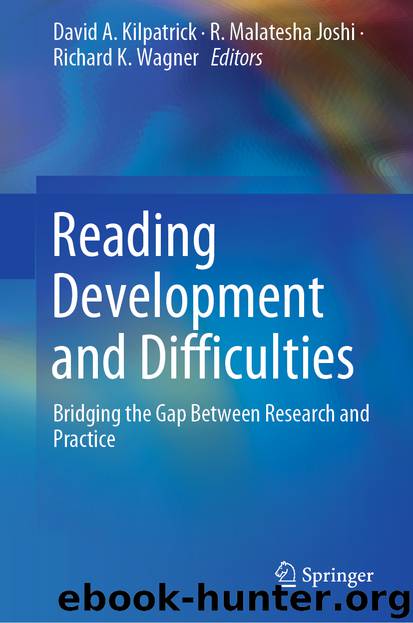Reading Development and Difficulties by David A. Kilpatrick & R. Malatesha Joshi & Richard K. Wagner

Author:David A. Kilpatrick & R. Malatesha Joshi & Richard K. Wagner
Language: eng
Format: epub
ISBN: 9783030265502
Publisher: Springer International Publishing
6.5.2 Language and Reading Comprehension Difficulties
In this section, we focus on children whose reading comprehension skills reflect persistent poor language skills over and above what may be associated with their L2 status and their word reading skills. Research with English monolinguals suggests that different types of poor comprehenders emerge at different times in reading development. Typically, the difficulties poor decoders experience emerge in the primary grades when the impact of poor decoding on reading comprehension is first appreciated (Catts, Adlof, & Ellis-Weismer, 2006). Poor comprehenders, sometimes referred to as “unexpected poor comprehenders” or as “late-emerging” poor comprehenders (Farnia & Geva, 2019; Li & Kirby, 2014), are students who do not have difficulties with decoding but have difficulties with oral language skills such as vocabulary, syntactic skills, morphological awareness, listening comprehension, storytelling, and ability to comprehend figurative language (Lesaux & Kieffer, 2010; Lesaux, Lipka, & Siegel, 2006). Importantly, they have persistent difficulties with higher-order language and cognitive skills such as inference making, comprehension monitoring, and the ability to utilize conjunctions and other connectives to help them with text comprehension (Cain, Oakhill, & Bryant, 2004; Catts et al., 2006; Geva & Fraser, 2018; Li & Kirby, 2014).
Late-emerging poor comprehenders may have intact word reading skills compared with their L1 peers and even other L2 learners who come from similar backgrounds (Geva & Herbert, 2012; Geva & Massey-Garrison, 2013; Li & Kirby, 2014). The difficulties of late-emerging poor comprehenders are more likely to be noticed when the nature of reading tasks change, and the impact of persistent poor language skills becomes more noticeable, often around Grade 4. These reading comprehension difficulties may not be as noticeable when the reading material is less demanding in terms of content and cognitive demands. When the focus of reading instruction is mostly on developing fluent word reading and decoding skills, their difficulties may be attributed to lacking L2 proficiency. However, the story changes once the material becomes more demanding, when the nature of reading undergoes additional qualitative changes and students need to be able to learn from the text they read. Some children may be able to read single word or text involving high-frequency words with fluency but experience difficulty with reading texts fluently, because as the texts become more linguistically demanding, the content is novel and more dense (Oakhill & Cain, 2012), requires inferencing, and readers need to pay attention to macro level aspects of the texts they read (Afflerbach, Pearson, & Paris, 2008; Oakhill et al., Chap. 5, this volume; Prior, Goldina, Shany, Geva, & Katzir, 2014).
Assessing ELLs with underlying problems in language processing is difficult because it is not easy to tease apart the extent to which poor reading comprehension is related to their general L2 proficiency or to additional underlying difficulties. Even though there is little research in this area, we know from our experience of working with ELLs in our university clinic that it is possible to identify “unexpected” poor comprehenders among ELLs just as we can with L1 students. Like their L1 peers, these individuals may have relatively intact decoding skills.
Download
This site does not store any files on its server. We only index and link to content provided by other sites. Please contact the content providers to delete copyright contents if any and email us, we'll remove relevant links or contents immediately.
| Administration | Assessment |
| Educational Psychology | Experimental Methods |
| History | Language Experience Approach |
| Philosophy & Social Aspects | Reform & Policy |
| Research |
The Art of Coaching Workbook by Elena Aguilar(51151)
Trainspotting by Irvine Welsh(21633)
Twilight of the Idols With the Antichrist and Ecce Homo by Friedrich Nietzsche(18618)
Fangirl by Rainbow Rowell(9226)
Periodization Training for Sports by Tudor Bompa(8249)
Change Your Questions, Change Your Life by Marilee Adams(7733)
This Is How You Lose Her by Junot Diaz(6872)
Asking the Right Questions: A Guide to Critical Thinking by M. Neil Browne & Stuart M. Keeley(5752)
Grit by Angela Duckworth(5597)
Red Sparrow by Jason Matthews(5462)
Paper Towns by Green John(5174)
Room 212 by Kate Stewart(5102)
Ken Follett - World without end by Ken Follett(4719)
Housekeeping by Marilynne Robinson(4434)
The Sports Rules Book by Human Kinetics(4377)
Double Down (Diary of a Wimpy Kid Book 11) by Jeff Kinney(4257)
Papillon (English) by Henri Charrière(4252)
The Motorcycle Diaries by Ernesto Che Guevara(4084)
Exercise Technique Manual for Resistance Training by National Strength & Conditioning Association(4057)
